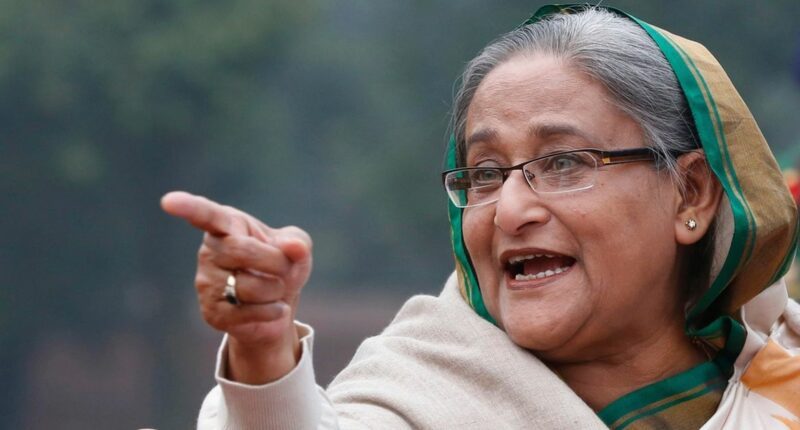Share this @internewscast.com
Bangladesh’s deposed Prime Minister, Sheikh Hasina, has been sentenced to death by a special tribunal for her role in suppressing a student uprising last year, an event that resulted in the deaths of hundreds and ultimately ended her 15-year leadership.
The International Crimes Tribunal located in Dhaka also handed down a death sentence to former Home Minister Asaduzzaman Khan, citing his part in the violent response to demonstrators.
Both Hasina and Khan had sought refuge in India last year and were subsequently sentenced in their absence.

Meanwhile, a former police chief, who turned state witness against Hasina and admitted guilt, received a five-year prison sentence.
The charges against Hasina and Khan were primarily related to their alleged involvement in the deaths of hundreds during a student-led protest movement in July and August of 2024.
According to the country’s health adviser under the interim government, the unrest claimed over 800 lives and injured approximately 14,000 individuals. However, a UN report from February suggested the death toll could be as high as 1,400.
Hasina says the charges are unjustified, arguing that she and Khan “acted in good faith and were trying to minimise the loss of life”.
“We lost control of the situation, but to characterise what happened as a premeditated assault on citizens is simply to misread the facts,” she said on Monday in a statement denouncing the verdict.
The verdict comes as the country still grapples with instability after Hasina was ousted on August 5, 2024. Bangladeshi Nobel Peace Prize laureate Muhammad Yunus took over as the head of an interim government three days after her fall. Yunus has vowed to punish Hasina and banned the activities of her Awami League party.

A three-member tribunal, headed by Justice Golam Mortuza Mozumder, announced the tribunal’s ruling, a session that was broadcast live.
Some of those in the packed courtroom cheered when Mazumder announced the death penalty for Hasina. He admonished them, telling them to express their feelings outside the courtroom.
Many families of the killed and the injured during last year’s uprising waited for hours outside the tribunal ahead of the verdict.
It appeared unlikely that Hasina would return to Bangladesh to face her sentence. India had not responded to requests by Bangladesh to extradite her to face the trial.

The interim government beefed up security ahead of the verdict, with paramilitary border guards and police deployed in Dhaka and many other parts of the country.
Hasina’s Awami League party called for a nationwide shutdown to protest the verdict on Monday.
Hasina denounced Monday’s ruling, calling it “biased and politically motivated” in a statement. She also denounced the tribunal as “rigged” and alleged that it was “established and presided over by an unelected government with no democratic mandate”.
“In their distasteful call for the death penalty, they reveal the brazen and murderous intent of extremist figures within the interim government to remove Bangladesh’s last elected prime minister, and to nullify the Awami League as a political force,” Hasina said.

Hasina cannot appeal the verdict unless she surrenders or is arrested within 30 days of the judgment.
Tensions and disruptions grew in the country in recent days ahead of the verdict.
Nearly 50 arson attacks, mostly targeting vehicles, and dozens of crude bombs explosions were reported nationwide more than the past week. Two people were killed in the arson attacks, local media reported.
Authorities at the Supreme Court, in a letter to army headquarters on Sunday, requested the deployment of soldiers around the tribunal premises ahead of the verdict.
Yunus said his interim government would hold the country’s next elections in February, and that Hasina’s party would not get a chance to contest the race.
Bangladesh’s politics under Yunus has remained at a crossroads with limited signs of stability.















